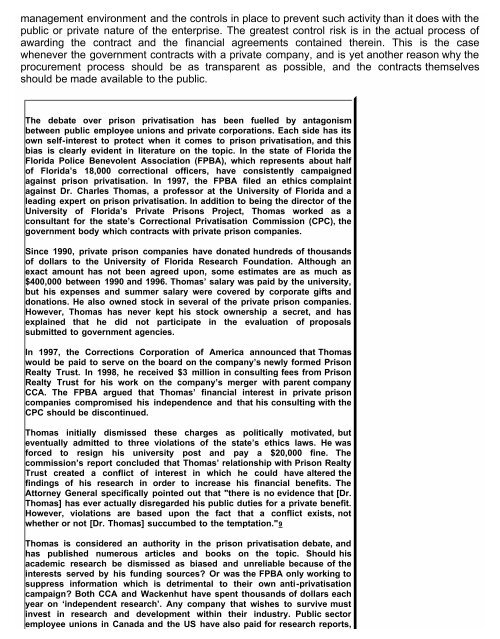prison privatisation in south africa issues, challenges and ...
prison privatisation in south africa issues, challenges and ...
prison privatisation in south africa issues, challenges and ...
You also want an ePaper? Increase the reach of your titles
YUMPU automatically turns print PDFs into web optimized ePapers that Google loves.
management environment <strong>and</strong> the controls <strong>in</strong> place to prevent such activity than it does with the<br />
public or private nature of the enterprise. The greatest control risk is <strong>in</strong> the actual process of<br />
award<strong>in</strong>g the contract <strong>and</strong> the f<strong>in</strong>ancial agreements conta<strong>in</strong>ed there<strong>in</strong>. This is the case<br />
whenever the government contracts with a private company, <strong>and</strong> is yet another reason why the<br />
procurement process should be as transparent as possible, <strong>and</strong> the contracts themselves<br />
should be made available to the public.<br />
The debate over <strong>prison</strong> <strong>privatisation</strong> has been fuelled by antagonism<br />
between public employee unions <strong>and</strong> private corporations. Each side has its<br />
own self-<strong>in</strong>terest to protect when it comes to <strong>prison</strong> <strong>privatisation</strong>, <strong>and</strong> this<br />
bias is clearly evident <strong>in</strong> literature on the topic. In the state of Florida the<br />
Florida Police Benevolent Association (FPBA), which represents about half<br />
of Florida’s 18,000 correctional officers, have consistently campaigned<br />
aga<strong>in</strong>st <strong>prison</strong> <strong>privatisation</strong>. In 1997, the FPBA filed an ethics compla<strong>in</strong>t<br />
aga<strong>in</strong>st Dr. Charles Thomas, a professor at the University of Florida <strong>and</strong> a<br />
lead<strong>in</strong>g expert on <strong>prison</strong> <strong>privatisation</strong>. In addition to be<strong>in</strong>g the director of the<br />
University of Florida’s Private Prisons Project, Thomas worked as a<br />
consultant for the state’s Correctional Privatisation Commission (CPC), the<br />
government body which contracts with private <strong>prison</strong> companies.<br />
S<strong>in</strong>ce 1990, private <strong>prison</strong> companies have donated hundreds of thous<strong>and</strong>s<br />
of dollars to the University of Florida Research Foundation. Although an<br />
exact amount has not been agreed upon, some estimates are as much as<br />
$400,000 between 1990 <strong>and</strong> 1996. Thomas’ salary was paid by the university,<br />
but his expenses <strong>and</strong> summer salary were covered by corporate gifts <strong>and</strong><br />
donations. He also owned stock <strong>in</strong> several of the private <strong>prison</strong> companies.<br />
However, Thomas has never kept his stock ownership a secret, <strong>and</strong> has<br />
expla<strong>in</strong>ed that he did not participate <strong>in</strong> the evaluation of proposals<br />
submitted to government agencies.<br />
In 1997, the Corrections Corporation of America announced that Thomas<br />
would be paid to serve on the board on the company’s newly formed Prison<br />
Realty Trust. In 1998, he received $3 million <strong>in</strong> consult<strong>in</strong>g fees from Prison<br />
Realty Trust for his work on the company’s merger with parent company<br />
CCA. The FPBA argued that Thomas’ f<strong>in</strong>ancial <strong>in</strong>terest <strong>in</strong> private <strong>prison</strong><br />
companies compromised his <strong>in</strong>dependence <strong>and</strong> that his consult<strong>in</strong>g with the<br />
CPC should be discont<strong>in</strong>ued.<br />
Thomas <strong>in</strong>itially dismissed these charges as politically motivated, but<br />
eventually admitted to three violations of the state’s ethics laws. He was<br />
forced to resign his university post <strong>and</strong> pay a $20,000 f<strong>in</strong>e. The<br />
commission’s report concluded that Thomas’ relationship with Prison Realty<br />
Trust created a conflict of <strong>in</strong>terest <strong>in</strong> which he could have altered the<br />
f<strong>in</strong>d<strong>in</strong>gs of his research <strong>in</strong> order to <strong>in</strong>crease his f<strong>in</strong>ancial benefits. The<br />
Attorney General specifically po<strong>in</strong>ted out that "there is no evidence that [Dr.<br />
Thomas] has ever actually disregarded his public duties for a private benefit.<br />
However, violations are based upon the fact that a conflict exists, not<br />
whether or not [Dr. Thomas] succumbed to the temptation."9<br />
Thomas is considered an authority <strong>in</strong> the <strong>prison</strong> <strong>privatisation</strong> debate, <strong>and</strong><br />
has published numerous articles <strong>and</strong> books on the topic. Should his<br />
academic research be dismissed as biased <strong>and</strong> unreliable because of the<br />
<strong>in</strong>terests served by his fund<strong>in</strong>g sources? Or was the FPBA only work<strong>in</strong>g to<br />
suppress <strong>in</strong>formation which is detrimental to their own anti-<strong>privatisation</strong><br />
campaign? Both CCA <strong>and</strong> Wackenhut have spent thous<strong>and</strong>s of dollars each<br />
year on ‘<strong>in</strong>dependent research’. Any company that wishes to survive must<br />
<strong>in</strong>vest <strong>in</strong> research <strong>and</strong> development with<strong>in</strong> their <strong>in</strong>dustry. Public sector<br />
employee unions <strong>in</strong> Canada <strong>and</strong> the US have also paid for research reports,
















